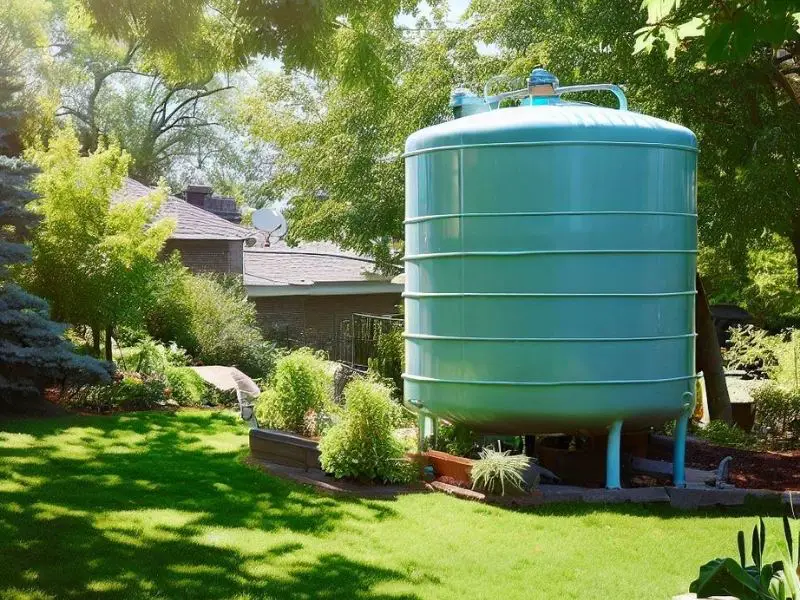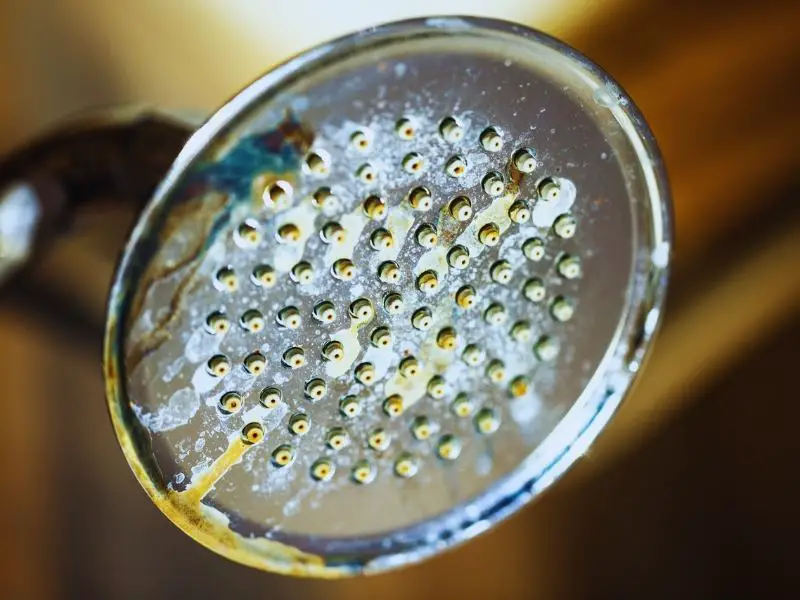
We’ve all done it before, filling up our mouths with shower water and gulping it down, but is shower water tap water safe? Should you freely drink it with no consequences or worries?
In the article below, you’ll learn where shower water comes from, if it’s safe to drink, and what you can do to prevent any problems with your shower water.
Shower water contains contaminants like magnesium, iron, and chlorine and is generally not the same as your tap water. Depending on your home, the shower water may not come from the same source or have the same filtered treatment as your tap water.
In this article:
Where does a shower water supply come from?
A shower water supply typically comes from the same water supply as other plumbing fixtures in a home. This could be from a municipal water system or a well. Less common is a rainwater collection tank.
Depending on the location and type of fixture, more than one source may be used. For instance, some areas require a dual-source system that utilizes both public water and non-public sources for residential use. In other cases, a single source may be used for all applications including showering.
Most houses in urban areas are hooked up to a public water supply, which is regulated by the Environmental Protection Agency (EPA). [1] They set standards for contaminants and pollutants that must be met before water can be used.
Houses in rural areas might be connected to a well, which is not regulated by the EPA. This means that homeowners need to check with their local health department or a certified water testing lab to make sure their bathroom tap water is safe.
Reasons shower water isn’t safe to drink
You can’t assume just because your shower water is safe to use that it is also safe to drink. Before satisfying your thirst mid-shower, take a look at the reasons your shower water may not be safe to drink.
You have an old home with old pipes
When an old home has outdated plumbing, it can be a major concern in terms of water quality and safety. Older homes are more likely to have galvanized steel or lead pipes, both of which can corrode over time, leaching dissolved metals into the water supply that can be harmful and could cause lead poisoning.
Signs of lead poisoning include increased blood pressure and abdominal cramps [2]. Additionally, sediment buildup within the pipes can affect the taste, odor, and appearance of water from showers and faucets, making it unsafe for consumption.
If you own an older home, it’s important to get your bathroom tap water tested regularly and replace any old pipes with modern materials such as copper or PVC to ensure that your shower’s hot water is generally safe.
Your shower water sits in a water storage tank

When water is stored in a tank before being used, it can become contaminated and make shower water unsafe to drink. If the water tank is not regularly cleaned, organic matter such as leaves, dirt, and other debris can collect in the bottom of the tank over time, introducing contaminants into the water supply.
Additionally, if there are any cracks or leaks in the tank’s walls or floor, outside contaminants such as bird droppings or animal waste may enter through them causing bacteria growth in your water.
Underground storage tanks (USTs) are more prone to corrosion and leaks that can affect groundwater quality, while aboveground storage tanks (ASTs) may be more exposed to weather and vandalism [3].
As a result, it’s important for homeowners to inspect their storage tanks regularly and take steps to fix any issues that arise so their shower water remains safe to drink.
Your shower head is old, dirty, or stained
Many homeowners don’t realize that their shower heads may be causing contamination in their shower water.
Old and stained shower heads can have a buildup of minerals or rust, which can leach into your water supply if not replaced.
The main concern with shower heads is not the minerals or rust themselves, but the bacteria that can grow on them [4]. Some shower heads can harbor a type of bacteria called atypical mycobacteria, which can cause respiratory infections or skin lesions in some people.
It’s important to regularly inspect the condition of your shower heads and replace them when necessary.
Your shower water runs through a water heater
If a water heater is not correctly maintained, it can be a major concern when it comes to the safety of shower water.
Over time, sediment buildup in a water heater can lead to corrosion that affects the taste and odor of the hot water running through showers and faucets. This corroded sediment can also be dangerous if ingested, making water unsafe for drinking if running through an unkept water heater tank.
What about drinking shower water that’s filtered or softened?
Shower water that has gone through a showerhead filter or has been softened doesn’t have as many minerals and contaminants as unfiltered water, making it safer to drink.
However, it’s recommended to never drink shower water because it hasn’t gone through the same levels of filtration as tap water and still contains some bacteria that can be harmful if ingested.
The sodium ions in softeners will help remove harmful chemicals but not enough to turn the hard water from your shower into drinkable water.
As mentioned earlier, even if you’re using one of the best showerheads for hard water there’s also a chance that your shower head is dirty and could be contaminating your water.

You can drink shower water in an emergency (it probably won’t kill you)
Even though shower water isn’t recommended to drink, you can do so if you are in an emergency [5]. It’s likely that the concentration of minerals and contaminants won’t be enough to cause your body to fail and, instead, it will just taste a little funky. Having too much, or a consistent amount, can cause your body to become sick and lead to possible complications.
If you haven’t had water in several days and are desperate, having a drink from your shower seems like an okay solution. But if you are drinking every day from your shower, you are probably causing unnecessary risk to your body.
Bear in mind that bottled water or boiling water is much preferable.
Is Hot Water or Cold Water from a Shower Safer to Drink?
Neither hot water and cold water from a shower are advisable to drink. You would need to test your shower water before drinking it to make sure that the levels of contaminants and minerals are not harmful to your body.
You can, however, drink hot water if you have installed a water softener or use a showerhead filter but you only want to take small amounts. Large doses can still cause problems to your body even if it goes through a filter.
So is it a good idea to drink shower water?
Shower water is not safe for regular drinking due to potential contaminants from outdated plumbing, contaminated storage tanks, or poorly maintained water heaters and showerheads.
Even filtered or softened shower water is not recommended for regular consumption.
In emergency situations, testing the water before drinking is essential to ensure it is safe for consumption.
